- Home
- Sherwood Smith
Whispered Magics Page 3
Whispered Magics Read online
Page 3
Once we tried a love potion on her parents. That was before both of them left and her grandmother moved in. Pat’s grandmother really loved her, but after only a year she died, and Pat’s aunt moved in—with her kids. Pat’s life was now exactly like Cinderella’s—except there was no fairy godmother and Pat no longer believed in magic.
I looked over at her, sitting on the stump crouched over her math book. I couldn’t see her face, but her bony shoulders looked fierce. That’s why she’s angry, I thought. It’ll hurt too much if this thing doesn’t work.
But I couldn’t say anything—I knew she’d hate it if I talked about all our tries to get to Narnia and Oz. I turned back to Nikki and Lissa.
“We can’t bring her grandma back to life,” I said.
Nikki made a face. “Yeah, Margo’s right. She might come back a zombie.”
“Eeeeeugh,” Lissa and I said together, exchanging gross-out looks.
“But if her parents were together again, and loved her?” Lissa said.
My mind was racing now. “Would it really work, though?”
“What do you mean?” Lissa and Nikki exclaimed at the same time, grinned at each other, and then turned to me expectantly. Another car whooshed through the rainy street, but this time neither of them noticed the splash.
“Well,” I said, “is it right to make people go back to the way they were without asking? I mean, how would you like it if a magic spell forced you to be like you were in first grade?” I asked.
Lissa said slowly, “We’re talking about getting them to love Pat again.”
“But they don’t,” Nikki said, frowning. “I think I see it—it’d be fake, wouldn’t it?”
“Right,” I said. “At least, fake or not, it would be fake for Pat. She’d always know they were back together because of the spell, not for her. Or even for each other.”
Lissa hopped again. “I see. They might not even act real—but like programmed dolls, or something, if we force them to change.” She stuck out her tongue. “Heck, there’s always a chance this won’t even work in the first place.” She glared at the talisman on my palm. “Will it really matter to us if it doesn’t?”
Again we looked at each other. “Not to me,” Nikki said, smacking her hands together. “I got my life planned out. College, law school, then goin’ after corporate pirates.”
Lissa whispered, “If it just were mine, I might have wished that I’d get a scholarship to a good dance school—except then I’d have to worry that I was good enough once I got there.”
“You want to wish you would be the best dancer in the world?” I asked.
Lissa’s whole body tensed as she closed her eyes, then she said, “No. It’s like what you said about Pat—I’d always know the applause was for the talisman, and not for me. I’d hate that.”
“So what do we do, throw it away?” I asked.
“There’s a chance it’s real,” Nikki said.
“I know,” Lissa said. “I’m just wondering if we could ask Pat if there’s something she would want.”
“And get our noses bitten off?” Nikki said, grinning. “She already let us know pretty clearly she thought this whole thing was stupid.”
They turned to me. “She wouldn’t touch that talisman,” I said. “Though she’s the one who needs it most.”
“So what do we do?” Lissa asked. “We can’t change her life for her—and she won’t take the thing and do it herself.”
I said, “Maybe we can’t send her to the ball, but we could give her a glass slipper.”
“What?” Nikki asked, making one of her faces.
Lissa’s eyes went wide, and she laughed. “I know what you mean,” she said, whirling into a little dance step on the sidewalk. “When Cinderella had that slipper, it was her proof that magic had happened—and it could happen again. We could give Pat hope. I mean, if magic is real just once, then it could happen again.”
“Anything could happen,” I said, thinking of all the stories I’d read—and all the ones I hoped to act out some day, on the stage.
“She might even start looking for it,” Nikki said, nodding slowly.
“So we’re all in favor?” I asked.
Lissa smiled, making a graceful dancer’s bow, and Nikki smacked her hands together. “Do it, Margo.”
I raised the talisman, the other two reached up to touch it as well, and I said, “We wish Pat would see magic.”
Then we turned to face Pat, not knowing what—if anything—to expect.
For a moment, nothing happened.
Then Pat’s head came up, and she looked at us. It was a long look, an odd look, as if she saw something else besides us. I felt a weird tingling in my bones, and around the edges of my vision light flickered, like tiny stars, but I didn’t dare move. Turn my head, even.
For a long time we all just stood there, and then Pat got up.
And she smiled.
It wasn’t a big grin, like Nikki’s best, or a giggly smile, like Lissa when she’s feeling silly. It was a little one, but it glowed in her eyes and her cheeks and her forehead—it made her all bright.
She picked up her books and came down the hill, still smiling.
I looked down at my empty hands—the talisman had disappeared. But it didn’t matter, I realized as I stooped to pick up my backpack. It didn’t matter because we’d each gotten a gift after all. We’d given Pat her glass slipper, and the look in her face gave it right back again.
“C’mon,” I said, laughing as I looked at the others. “Let’s go, or we’ll be late for the ball.”
The Princess, the Page, and the Master Cook’s Son
Kimet opened her eyes. Her dream vanished in the strong morning light slanting through the row of tiny attic windows. It was so cozy in her warm nest of blankets with the sun on her cheek—
The sun! She threw off her blankets and reached for her livery.
It was the first time she had ever woken up to sunlight in the dismal attic where the pages slept. Her shoulders hunched, braced against the anticipated sting of Steward Greb’s stick as she yanked her tunic straight and fumbled her sash into place.
She dashed out of her cloth-hung cubicle, glanced into the sleeping spaces directly opposite hers, and stopped when she realized that she was not alone. Blanket-covered bumps in the three she could peer into meant at least three of the other pages stuck on extra duty late the night before, when the Queen decided to have a midnight supper, were still asleep. Such a thing had never happened before.
“Sun’s up!” she cried, not wanting anyone else getting into trouble.
Tousle-haired girls popped their faces out of the cubicles, and heavy eyes widened to round-eyed surprise and dismay when they saw one another.
“It’s late!”
“Why weren’t we called, Kimet?”
“Is this a Greb trick, Kimet?”
“I don’t know,” she said in a low voice, peering fearfully down the ladder. “But I do know I was supposed to be on duty in the Queen’s chamber at sunup.”
At the word Queen, all the faces blanched. Kimet scrambled down the ladder, leaving shrill, anxious voices behind her, everyone asking questions that no one listened to.
She hesitated at the narrow door used by the servants. This route was long, dark, and often crowded, and being only a page and not yet under an order, she’d have to give way to everyone else pushing slow carts of dishes or bed-linens, dashing with royal messages, or bringing up silver trays with steaming food from the kitchens. Besides, if the Queen’s spies see that I’m late, they’ll blab to Steward Greb. She tiptoed away, and up to the carved door opening onto the upper landing of the royals’ Residence. You weren’t supposed to use that door unless you had to deliver something directly beyond it, then you had to come right back.
It would mean a terrible beating if she were caught wandering the royals’ halls, unless she could convince someone she had an errand. On the other hand the royals’ hallway was less than half the length of th
e servants’ as it did not have to wind around and up and down and behind all the huge rooms, and it was never crowded.
The stick if caught here, the stick if caught late—but if she used this shortcut and wasn’t seen, she might avoid both punishments.
Yes. Worth a try.
She opened the door and sped soundlessly down the marble hall.
Usually she gazed hungrily at the age-darkened tapestries on the walls, each time garnering some new detail of stitchery, design, color, and longing for the day to arrive when she’d have her place restoring them. That is, if the Queen didn’t get her way and use her daughter’s marriage to a neighboring Prince—or the new war—as an excuse for burning them all.
On her way to the Queen’s suite, which lay all across the entire length of the castle front, she sped by the newly-decorated corner wing where Princess Zarja had moved just before the visit from King Orthan’s son last winter. Last time Kimet was in this hall the door to the afternoon parlor had been open and she’d glimpsed the Princess sitting with the other noble girls on the terrace outside, their drawling voices carrying as they sat decorously, eating fruit from golden bowls and making fun of the customs of the other kingdom. The same noble girls who flattered the Princess to her face but maligned her behind her back, overheard by the pages who were regarded as furniture. The Princess wore a gown of crimson and gold that day, her skirt spilling in rich silken folds around her chair. Kimet had longed to feel that fabric, to smooth it against her cheek, and to examine the embroidery. . .
The Princess! Kimet ran faster. The pages assigned to her said that Zarja’s temper was growing more like the Queen’s every day, particularly since the recent declaration of war against King Orthan, whose son had spent the entire winter here, dining and dancing and hunting and hawking. Kimet did not want to be seen by the Princess, for Steward Greb’s beating would have to be severe indeed. The Queen would watch to make certain of it, and the Princess’s narrow, sour face would be right at her shoulder.
Voices echoed down a side hall. Voices and sword clanks and the ringing ching of chain mail. She skidded to a stop under a massive sideboard. Cowering there, she clapped her hands over her face. The laughter and voices resolved into familiar ones: four of the guardsmen from the castle walls.
What were they doing inside the Residence? The Queen had forbidden the guards to enter wearing anything but livery and the other servants’ silent wool-slippers, their weapons hidden, and decently muffled.
The voices diminished abruptly, as if the speakers had gone into a room and shut a door. Kimet climbed out and was about to run when she heard a muffled, gulping cry. It wasn’t very loud, but it reminded Kimet of the way the pages sounded after one of Steward Greb’s beatings, and her guts tightened with pangs of sympathy. She hoped it was no one she knew.
She sidled to the doorway from which the weeping had come, and peered in to discover no page, but Princess Zarja herself. Surprised, Kimet was about to retreat when the Princess, who was staring out the window at something in the rose garden, sucked in her breath on a shuddering sob, then put her hands over her face.
Kimet’s surprise sharpened into amazement, followed by a brightly burning ember of glee. See how the royal snit liked feeling that way!
Then loud voices echoed down from the corridor round the corner: “The Princess is not in her sleeping chambers! Find her. Now!”
“The Wizard wants a matched set, eh?” someone else said, and this was followed by harsh laughter.
The Princess jerked around, and she and Kimet stared into one another’s eyes for a long, painful heartbeat.
The Princess’s eyes were red from weeping, and her narrow face was drawn, not into the usual anger or haughtiness, but terror.
The same terror to be seen in the faces of the pages when Steward Greb loomed up, tapping his switch against his palm.
Kimet didn’t think. She just acted. This room was the smallest of the reception chambers, with the service door on the opposite wall from the entry way. Kimet sprang to it and pushed the catch. The door opened silently. She beckoned to the Princess, who ran inside, stumbling over her hem, and Kimet pulled the door shut a heartbeat before heavy boots tromped into the reception chamber. Zarja’s breathing was harsh. She had obviously never run in her life, and was further encumbered by her heavy, brocaded-silk dressing gown with its voluminous, dragging skirts.
When the noise of the search diminished again, the Princess said, “Get me away from here.”
Kimet obeyed, of course, as good pages are trained to do. She led the Princess down the strangely empty service corridor, and at the landing, paused and said, “Where to, Your Highness?”
“Anywhere,” the Princess snapped, though her voice shook. “Anywhere secret. Don’t let them find me.”
Hide from the King’s guards? The Princess choked on a sob. Kimet shook her head as she led the way up the stairs.
“Are you in trouble, Your Highness?” she asked as they started up another flight of stairs. She could imagine the royal heralds wanting to beat the Princess, but she couldn’t imagine them being allowed to, any more than the royal tutors had been when the Princess was small and had thrown her shoes, her dishes, and her toys at them. From all accounts she didn’t throw shoes anymore, but she ignored the heralds just the same, though she was supposed to be learning statecraft. And there was nothing they could do but smile.
“You’re not supposed to ask questions,” the Princess scolded. That sounded more like her usual self, and though Kimet felt a stab of the old annoyance, she found it a little reassuring. At least one thing was back to normal. She might not like it, but she was used to it. This being allowed to sleep in, the guard in the royal chambers, above all the distant laughter and, close by, the Princess’s weeping—those things were frightening because they were so strange.
They climbed in silence, stopping midway up one of the towers. They were on a seldom-used service landing. The main rooms in this tower were crammed with old-fashioned royal furnishings and ancient trunks. When younger, before Steward Greb came into control, the pages had sometimes retreated there to play during their rare free time. Kimet had always liked to sit perched on a pile of ancient baskets next to one of the old-fashioned arrow-slit openings, and practice her more difficult stitches on rags and scraps as she chatted with friends.
She led the Princess into the tiny hidden room. Morning sunlight streamed in through the two slit-windows, parallel shafts of light painting the stone floor. As the two girls moved, dust swirled in and out of the sun-shafts, brief-lit then dimming.
“This is disgusting,” the Princess snapped, arms crossed, hands tightened into fists.
“It’s storage, your highness,” Kimet said.
“At least it could be clean.”
Kimet didn’t know how to answer that without earning a beating, so she just bowed, hands folded before her the way the Queen required, her head meekly lowered.
“Don’t just stand there, dolt! Dust something off so I can sit down,” the Princess commanded, but her voice was still breathless, still too high.
Kimet obeyed, using the edge of her own clothing to clear off a place on one of the trunks. She spied a new addition to the clutter, yet another of the ancient tapestries, this one from the formal audience chamber, now junked in a bent roll like an old carpet.
As the Princess glanced at the dusted trunk, sniffed, and lowered herself daintily to the very edge, Kimet lovingly lifted the tapestry and smoothed it onto an old table.
There were only two tapestry restorers now. Both were aging, having been appointed by the previous Queen as the present Queen hated old tapestries, which was why the tapestries had been migrating one by one from the public rooms to the back halls, and finally to this jumble.
The Queen had stated at Kimet’s promotion interview, “This stitchery of yours is all very well, but I want to be rid of those dirty, ugly things. When my daughter marries, I will have the castle walls redone in gold-flecked velve
t. Begin a new fashion. In the meantime, I require pages. Errand runners are useful. Stitchers on old rubbish are not.”
Remembering that remark about Zarja’s marriage, Kimet looked down at the Princess’s face and saw dried tear-tracks on her cheeks.
There was silence for a time, Kimet standing, hands folded, watching the Princess who picked at the lacing on her gown. Finally Zarja jerked her chin up. “You could at least get me something to eat.”
“What if someone asks after you, Your Highness?”
“You don’t know where I am. Unless it’s . . .” The Princess bit her lip, and her shoulders hunched up sharply. “No. I don’t know whom I can trust. I’d thought Master Elcan was a friend, and Captain Dormar . . .”
Kimet was puzzled. She pictured Master Elcan’s bony face. The nobles called him ugly, but he was always interesting to Kimet as he performed little tricks to entertain the staff. “The Master Wizard? Not a friend?”
Princess Zarja sniffed again, but it wasn’t the sharp hissy sniff of anger, it was the gulping sniff of someone on the verge of tears. She raised her blotched face and rubbed her pointy nose. It was red from her crying, almost as red as her eyes. “He . . . he turned my parents into statues. In the royal garden. And Captain Dormar . . . He always bowed so low whenever he saw me, and his guards were always so polite . . . He laughed when he saw them. Laughed. And said, ‘They’ll make royal bird perches!’”
“Statues, your highness?” Kimet repeated, horrified.
Zarja jerked her chin up and down, looking horribly like a bobbing wooden toy. “I saw it. And then the First Scribe came out, and she too was laughing . . .” The Princess’s mouth quivered and she buried her face in her hands.
“Statues?” Kimet said again, and moved to the nearest slit window. She could see the royal garden from this tower. Yes. There, right in the middle of the roses, stood two new statues, marble-veined white. One was tall and fat, the frosty white crown spiked exactly like the King’s golden crown, and the other figure was short, arrogant of stance even in stone, chin up at a haughty angle, the folds of her long brocade dressing gown now hardened into smooth marble.

 Inda
Inda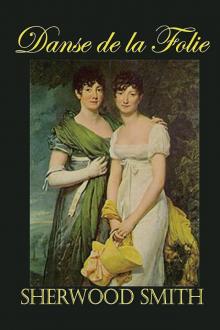 Danse De La Folie
Danse De La Folie King's Shield
King's Shield Whispered Magics
Whispered Magics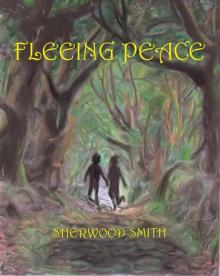 Fleeing Peace
Fleeing Peace Barefoot Pirate
Barefoot Pirate Crown Duel
Crown Duel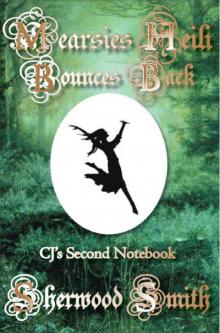 Mearsies Heili Bounces Back
Mearsies Heili Bounces Back Commando Bats
Commando Bats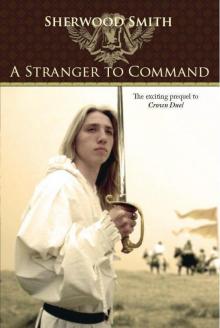 A Stranger to Command
A Stranger to Command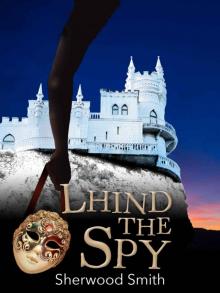 Lhind the Spy
Lhind the Spy The Spy Princess
The Spy Princess Blood Spirits
Blood Spirits Sasharia en Garde
Sasharia en Garde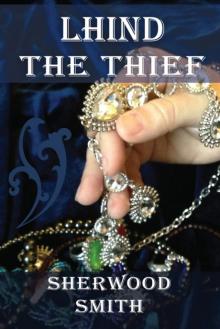 Lhind the Thief
Lhind the Thief Paradise Drift
Paradise Drift Banner of the Damned
Banner of the Damned The Trouble With Kings
The Trouble With Kings Poor World
Poor World Treason's Shore
Treason's Shore Wren Journeymage
Wren Journeymage A Posse of Princesses
A Posse of Princesses Revenant Eve
Revenant Eve Once a Princess
Once a Princess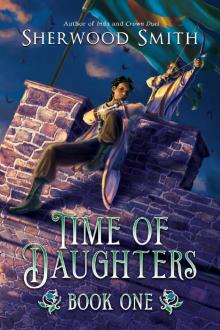 Time of Daughters I
Time of Daughters I Rondo Allegro
Rondo Allegro Coronets and Steel
Coronets and Steel Over the Sea
Over the Sea Senrid
Senrid Hunt Across Worlds
Hunt Across Worlds A Sword Named Truth
A Sword Named Truth The Fox
The Fox Twice a Prince
Twice a Prince Fair Winds and Homeward Sail: Sophy Croft's Story
Fair Winds and Homeward Sail: Sophy Croft's Story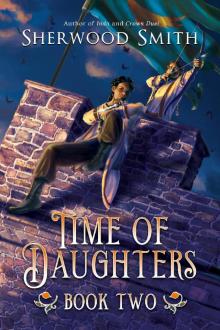 Time of Daughters II
Time of Daughters II The Rifter's Covenant
The Rifter's Covenant The Phoenix in Flight
The Phoenix in Flight Stranger
Stranger The Thrones of Kronos
The Thrones of Kronos A Prison Unsought
A Prison Unsought Twice a Prince: Sasharia En Garde Book 2
Twice a Prince: Sasharia En Garde Book 2